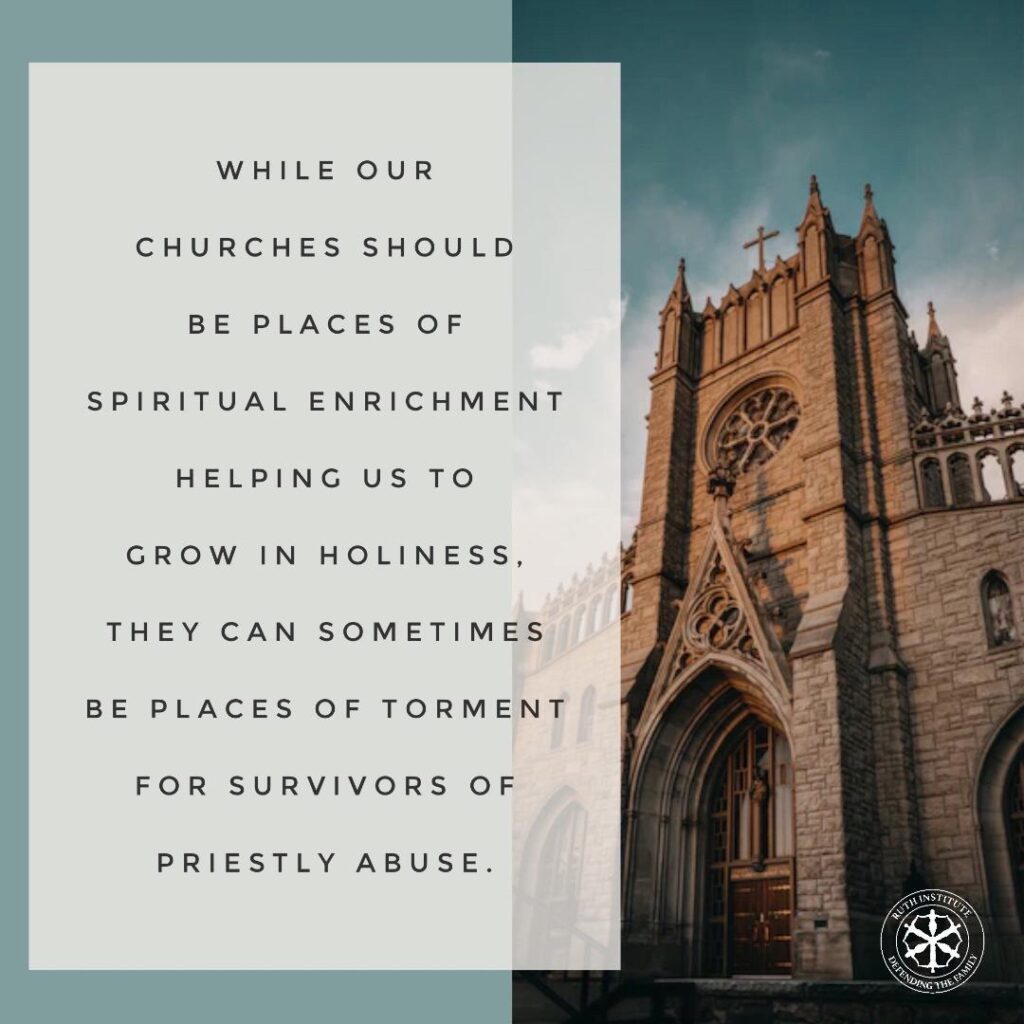Returning to church and to the sacraments (especially confession) after priestly abuse can undeniably be difficult. I wrote a bit about it here.
While our churches should be places of spiritual enrichment helping us to grow in holiness, they can sometimes be places of torment for survivors of priestly abuse. There is perhaps no place where we are forced to be more vulnerable than in the confessional. It’s true. As Catholics, we believe that Jesus is working through the priest to forgive sins. Confession is a powerful sacrament. Yet, what happens when you have been betrayed by a priest especially one who has used your vulnerabilities to abuse you? Returning to confession is perhaps one of the hardest steps for a victim trying to live out their faith.

As a survivor of priestly abuse, I want to offer some perspective on this issue and some advice. This article stood out to me and serves as my starting point. Suffice it to say, articles such as this one might hit me differently than the average Catholic since I have suffered because of priestly abuse.
The sacrament of confession (also known as reconciliation) is often overlooked among Catholics, and I appreciate that the author is bringing attention to it. I do wholeheartedly agree with most everything she says in her article. She offers some great advice for the average Catholic, and parents can certainly gain a lot from reading this article. However, since not everyone is coming from the same place as a survivor like me, I would like to expand on her article a bit, add some food for thought, and provide some advice for abuse survivors who are trying to return to confession. I hope that parents who are concerned for their children’s safety might also find this advice helpful!
Sexual Grooming
First of all, a lot of people don’t understand the sexual grooming that takes place in the majority of abuse cases. I understand that not every Catholic is going to pick up on the importance of this. However, one of the reasons clerical abuse survivors are hesitant to go to confession is that the overwhelming majority of predator priests have groomed their victims first.
Good Touch vs Bad Touch
Once you have an idea as to how grooming works, you start to gain a better understanding of how sexual abuse starts in the first place. With that being said, teaching children about good touch vs. bad touch in an age-appropriate way is definitely something every parent should do. I highly encourage it! However, I want to add that a parent can teach their child all there is to know about good touch vs bad touch, and yet that child can still fall victim to a predator.
A child cannot possibly remember everything about touch and bodily autonomy, especially in a stressful situation. Once a predator has groomed a child and the touching starts, the child is caught by surprise. Everything that the child has been taught more or less goes out the window.
Case in point: My parents taught me (in appropriate terms) the difference between good touch and bad touch. They taught me about boundaries and what to do if someone crossed a boundary. However, nothing could fully prepare me for when the touching started. All victims respond differently. Some fight and others freeze. I froze.
Familiar or Unfamiliar
A third point I want to bring up is that not everyone feels comfortable going to Confession to a priest they know well. No, I’m not saying this just because some people might feel embarrassed about confessing certain sins. When someone has previously been groomed and abused by a priest, they might feel uneasy about regularly going to confession to a priest you know.
I have known victims on both sides of the aisle. Some feel less threatened confessing to a priest they don’t know since grooming more often occurs by predators who know their victims. Other survivors feel more comfortable confessing to a trusted priest. My advice is to do what works best for you if you are struggling.
I know, I know. Some of you might be cringing at this! Personally, I was taught that a priest should get to know you so they can better help you avoid sin. That is absolutely a valid point and one worth considering. However, considering the circumstances particularly of an abuse survivor, I don’t think it’s too difficult to understand why confessing to the same priest regularly might not be possible for some individuals. Confession is a sacrament that requires vulnerability. Many victims feel too vulnerable to tell their sins to someone who could potentially groom them. A predator is, after all, more likely to be someone you know. Many priestly predators have used the sacred sacrament of Confession to groom their victims. The more a predator knows about their victim, the easier it is to take advantage.
Confessional Location and Setup
The location and setup of the confessional itself is also something to be taken into consideration. I definitely agree with the author on this one! I was taken advantage of by a priest from my own parish, a parish I still attend. Going into the same confessionals is painful. My body immediately goes into “defense mode” especially since the confessionals are basically closets allowing you to choose face to face or behind a screen. After all the issues the church has had, I personally do not believe that face to face confessionals should even be an option at this point. If someone has a need to confess to a priest face to face, they could always make an appointment.
Also, where is the confessional located? Is it in view of other people? Is it tucked away into a private, obscure corner where abuse might be more likely? Confession is certainly a private matter, but I personally would not feel safe entering a confessional that is too out of the way. As a parent, I like to be able to see my children go in and be able to keep eyes on the confessional until they come out.
I feel far much more at ease going into a confessional where 1) there is no possibility of inappropriate touching and 2) there are no painful memories that will detract from what I am trying to do (come before God with my faults).
More often than not, I choose to go to a different parish for confession. Again, I think all survivors have to do what works for them. Parents, you have to make that choice for your children.
A Note to Parents
For parents out there who are concerned about bringing your kids to confession or anywhere else (especially if one or both parents are survivors of clerical abuse), it’s up to you to determine your comfort level of leaving your children alone in any place for any period of time with any person. Ultimately, you can teach your child all the right “stuff” and do all the right things, but abuse can still happen. This is true of anywhere you allow your children to go whether it’s school, the park, public restrooms, churches, the library, etc.
Parents should teach their children (at the appropriate ages and times) about inappropriate touch and bodily autonomy. However, no child is going to pick up on the fact that they are being groomed, nor are they going to remember everything they have been taught when inappropriate touching starts. Burdening a child with such a responsibility would be far too overwhelming. Parents should also focus on teaching children that, even if they were to be molested, it is never their fault.
You are not Alone!
If you are a victim of clerical abuse and struggling to return to confession, you are not alone. Here is a summary of my advice:
- Pray about it. God isn’t going to abandon you! Trust in Him and He will give you the graces you need.
- Take it slow. God isn’t going anywhere! Keep doing what you can, keep praying, trusting, and don’t give up.
- Seek the council of a good, holy person you trust. Consider getting a spiritual councilor or a Catholic therapist who can help guide you through the process.
- Go to Adoration regularly. Adoration can be an opportunity to, not only pray, but to slowly dip your toes into coming back to the sacraments. For Catholics, the True Presence is at the core of our faith. Focusing on that can be incredibly beneficial for anyone trying to come back. For me, regularly attending Adoration helped me to focus on the Eucharist. In this way, I truly believe that God gave me the gifts I needed to return to regular Confession again.

The Catholic Church’s Role
The church certainly needs to focus on giving priests the correct training to better deal with abuse victims. There needs to be more respect and empathy for victims. Priests need to commit to helping make the vulnerable sacrament of confession a safe one for people suffering with wounds caused by priestly abuse. With prayer, time, and a lot of work, confession can become a safe place for survivors – one of healing and grace.
Have you had experience returning to confession and the sacraments following abuse? What advice do you have for others who are struggling? I would love to hear from you! Feel free to leave a comment below or email me at AdviceFromaSurvivor@RuthInstitute.org.
